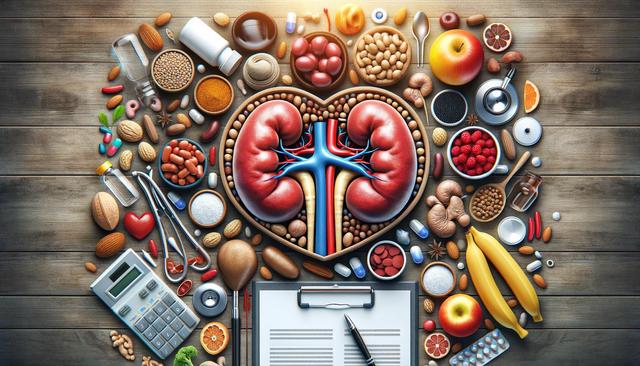Understanding the Role of the Kidneys
The kidneys are essential organs responsible for filtering waste and excess fluids from the blood, regulating blood pressure, balancing electrolytes, and producing hormones that influence other bodily functions. Each day, our kidneys process about 50 gallons of blood, removing waste and extra water to make urine. When kidneys are functioning properly, these processes go unnoticed; however, when they begin to fail, the effects can be serious and wide-ranging. For individuals undergoing dialysis, kidney function is already compromised, making supportive strategies even more vital to overall health and quality of life.
Dialysis performs some of the functions of healthy kidneys, but it cannot fully replicate their natural abilities. Therefore, protecting existing kidney function and supporting the body through diet, hydration, and lifestyle changes can make a meaningful difference. Understanding the importance of kidney function is the first step toward adopting effective practices to maintain or enhance kidney health.
Nutrition Strategies for Kidney Support
One of the most effective ways to support kidney health, especially for those on dialysis, is through mindful nutrition. A kidney-friendly diet helps manage waste buildup in the body, reduces the workload on the kidneys, and can help control blood pressure and blood sugar levels. Key dietary guidelines often include:
- Limiting sodium to help control blood pressure and reduce fluid retention
- Managing potassium and phosphorus intake, as excess amounts can build up in the blood when kidneys are not functioning well
- Monitoring protein consumption to avoid overburdening the kidneys while ensuring adequate intake for tissue repair and maintenance
Patients should work with a registered dietitian familiar with kidney disease to tailor a diet that meets their specific health needs. For those undergoing dialysis, nutritional requirements can vary significantly depending on the type and frequency of treatment, making individualized guidance essential.
Hydration and Fluid Management
Staying hydrated is essential for kidney health, but for individuals on dialysis, fluid intake often needs to be carefully controlled. Healthy kidneys regulate fluid balance naturally, but in kidney failure, extra fluid can accumulate in the body, leading to complications such as high blood pressure, swelling, and heart strain.
Effective fluid management strategies include:
- Tracking daily fluid intake, including hidden fluids in foods like soups, fruits, and ice
- Using smaller cups to reduce intake gradually
- Limiting salty or spicy foods that increase thirst
- Chewing gum or sucking on ice chips to alleviate dry mouth without consuming too much fluid
Dialysis patients often receive specific fluid limits from their healthcare providers, and adhering to these guidelines can significantly improve comfort and health outcomes between treatments.
Lifestyle and Physical Activity
Incorporating healthy lifestyle habits can contribute significantly to kidney health and overall well-being. Regular physical activity, for instance, helps control weight, manage blood pressure, and improve cardiovascular health—all of which are important for people with chronic kidney disease or those undergoing dialysis.
Recommended activities include:
- Walking, swimming, or cycling for 30 minutes most days of the week
- Stretching and low-impact exercises to maintain flexibility and reduce fatigue
- Light strength training, with physician approval, to preserve muscle mass
Additionally, avoiding smoking and limiting alcohol consumption can reduce further kidney damage. Mental health is also important; managing stress through mindfulness, support groups, or counseling can help patients cope with the emotional challenges of chronic kidney disease.
Monitoring and Medical Support
Regular monitoring and a strong partnership with healthcare providers are crucial for managing kidney health. Routine blood tests, urine analysis, and imaging can help track kidney function and detect issues early. For those undergoing dialysis, frequent checkups ensure the treatment remains effective and that any complications are addressed promptly.
Key aspects of medical support include:
- Keeping track of lab results such as blood urea nitrogen (BUN), creatinine, and electrolyte levels
- Following prescribed medications closely, including phosphate binders, blood pressure medications, and supplements
- Communicating openly with the care team about symptoms, side effects, and lifestyle changes
Patients are encouraged to be active participants in their care, asking questions and staying informed about their condition. This collaborative approach can lead to better health outcomes and a more manageable experience with dialysis and kidney disease.
Conclusion: Empowering Long-Term Kidney Health
Supporting kidney health requires a comprehensive approach that includes proper nutrition, fluid management, physical activity, lifestyle adjustments, and vigilant medical care. For individuals on dialysis, these strategies are not just beneficial—they are essential. While dialysis substitutes for some kidney functions, it cannot fully replace the complex roles kidneys play in the body. By adopting effective practices and working closely with healthcare professionals, individuals can take meaningful steps to preserve their well-being and maintain a higher quality of life. Staying informed, proactive, and engaged in one’s health journey is key to managing the challenges of kidney disease while supporting long-term vitality.








